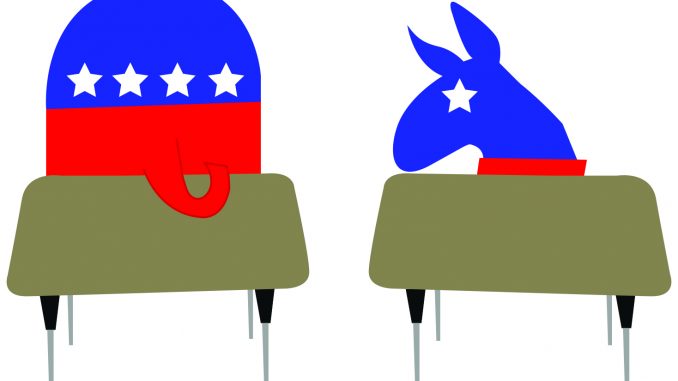

As a journalism and political science major, I often find myself in classrooms full of students with strong views — political or otherwise — and professors willing to discuss touchy subjects.
In many ways, this is what college is all about: being challenged to develop ideas and belief systems we’ll carry with us for the rest of our lives.
But there’s a problem on Temple University’s Main Campus; students are afraid to disagree.
Instead of contributing different — perhaps opposing — ideas to a conversation, they sit in silence. While it is absolutely a student’s choice whether they want to speak up on sensitive topics or tell classmates about their party affiliation, more diversity of opinion is better for everyone in the classroom.
A Niche survey found a majority of Temple students, 53 percent of the student body, said they identify with the Democratic Party. Only 8 percent of the survey respondents identify as republican, and 20 percent were independent.
But the outnumbered voices need to be heard, too.
Sometimes, these voices simply aren’t present in the classroom, but when they are, students would be doing themselves and their peers a favor by beginning a civil discussion. Professors can make sure opposing opinions are at least acknowledged to avoid creating an us-against-them environment in the classroom.
Even if students passionately disagree, everyone gains a new understanding when those disagreements are aired out in a respectful way.
While diversity is increasing on college campuses, it’s lagging in two areas: ideology and socio-economic status, former Brown professor Tori Haring-Smith wrote in an Association of American Colleges and Universities journal in 2012. Haring-Smith worked to present opposing ideas in the classroom in the 1980s-90s, and even then, she found few students were willing to argue them.
Although I’m advocating for more debate on campus, I often find myself hesitant to speak up in class. Being a conservative who is involved with several right-leaning clubs on campus can be tricky. But I’ve always felt respected when I decide to voice my opinion. The challenge is getting over the nerves of voicing an opinion at all. The idea of speaking up has always been scarier than actually doing so.
Michael Hagen, a political science professor, said oftentimes, he ends up playing devil’s advocate for a student’s opinion because a fellow student won’t chime in and do so.
“Honestly, I think people who hold beliefs that they think might be out of step with the majority are pretty reluctant to speak up,” Hagen said. “Especially in the last couple of years, it is difficult to get people from all places on the political spectrum to speak up and speak confidently.”
Regardless of students’ personal experiences or political beliefs, they should feel comfortable contributing to discussions. No two students at the university have lived identical lives, and we come to college to expand our horizons, which is not a comfortable endeavor. But we shouldn’t encourage ideological homogeneity.
“It would be better for us all in the long run if there were more disagreement,” Hagen said. “It’s good to practice talking about things we disagree about.”
Jeff Finley is a junior political science major and the chairman of Temple’s chapter of Young Americans for Freedom, a conservative organization that promotes free-market ideas and encourages conservative students to have a presence on college campuses. Finley is a Republican who doesn’t mind speaking up in class, he said.
“We should have a more diverse ideology [on Main Campus],” Finley said. “Professors should let their students know that if you oppose someone else’s views, that’s fine.”
I’m not advocating for students to scream at each other for the sake of voicing their opinions. I’m suggesting students take initiative to respectfully disagree and have healthy discussions.
Not understanding political opponents makes it easy to call them “evil” or “stupid.” Of course, this isn’t an issue that solely pertains to college campuses.
Perhaps one of the causes of being so out of practice in this regard is social media culture. We insulate ourselves by following friends and blocking foes. But our real lives shouldn’t be like this.
One purpose of going away to college is to break out of our bubbles and listen to the other side, even if it’s for no other reason than to challenge our perspectives. But this is impossible if our ideas aren’t challenged.
It only takes one student to speak up and show the rest of the class that it’s OK to disagree. While most in-classroom debates won’t end in agreement, I think most will end in understanding.



Be the first to comment